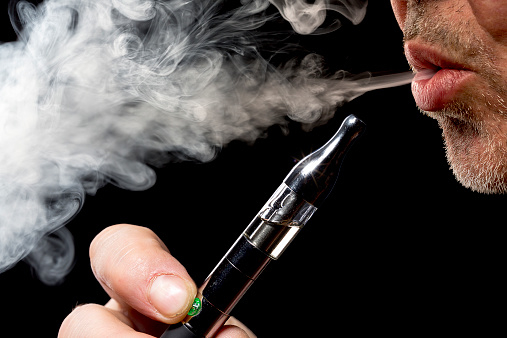 A recent NPR-Truven Analytics Health poll of more than 3,000 participants shows the large majority of Americans support the proposal by the U.S. Food and Drug Administration (FDA) to the White House to regulate e-cigarettes in the same way they do regular tobacco products. This would include limitations like not being able to sell e-cigarettes to minors, a nicotine warning, and full disclosure of its ingredients on the label.
A recent NPR-Truven Analytics Health poll of more than 3,000 participants shows the large majority of Americans support the proposal by the U.S. Food and Drug Administration (FDA) to the White House to regulate e-cigarettes in the same way they do regular tobacco products. This would include limitations like not being able to sell e-cigarettes to minors, a nicotine warning, and full disclosure of its ingredients on the label.
Overall, 57% of Americans polled agreed that this type of regulation is necessary. When breaking down the results of the poll further, the two demographics that supported the proposed regulation the most were those respondents with a college degree or higher education level and those who made a salary of upwards of six figures, each polling at 65% in favor.
Interestingly, the only group where less than 50% of respondents agreed with the regulations were those who had a high school diploma or lower level of education. Conversely, respondents over the age of 65 and under the age of 35 also rated highly in favor of the FDA proposal.
This battle for regulation by the FDA has actually gone on for more than a year now, from its initial proposal in April of last year. Leading up to the October 19 issuing of the FDA’s proposal for White House review this year, the FDA has continued to do ground-level research on the health issues of e-cigarettes. The Office of Management and Budget now has 90 days to review the proposal, where they, too, can make changes as they see necessary before allowing any of the regulations to take effect.
The same poll finds that a significant number of respondents have at least tried e-cigarettes, up to 26% according to the results. A similar percentage of respondents admitted to being current tobacco smokers. The percentage of both e-cigarette and tobacco users dips dramatically with groups 65 or older, down to 10% and seven percent respectively, with the percentage increasing among those with a high school education or lower.
Among those polled who did try e-cigarettes, the most popular reason was to try to quit smoking with curiosity being a close second. Chief Medical Officer at Truven Health Analytics, Dr. Michael Taylor, admits there’s still a lot to learn about the effects of smoking e-cigarettes: “Electronic cigarettes have exploded in popularity in just a few short years, but we still know very little about the health risks associated with the technology.”
With the recent U.S. ban on e-cigarettes from checked airlines baggage on flights, it’s clear each industry is finding its own way to deal with what has become a popular piece of technology. The reason airlines gave for this ban is the risk of accidental fires started on flights, mainly due to batteries short-circuiting after being left to charge. This rule is set to take effect in the next two weeks.
Sources for Today’s Article:
Hensley, S., “Poll: Most Americans Support FDA Regulations of E-Cigarettes,” NPR web site, October 27, 2015: http://www.npr.org/sections/health-shots/2015/10/27/452244929/poll-most-americans-support-fda-regulation-of-e-cigarettes.
Associated Press, “US bans e-cigarettes from airline passengers’ checked bags,” CTV News web site, October 27, 2015; http://www.ctvnews.ca/health/u-s-bans-e-cigarettes-from-airline-passengers-checked-bags-1.2630192.
